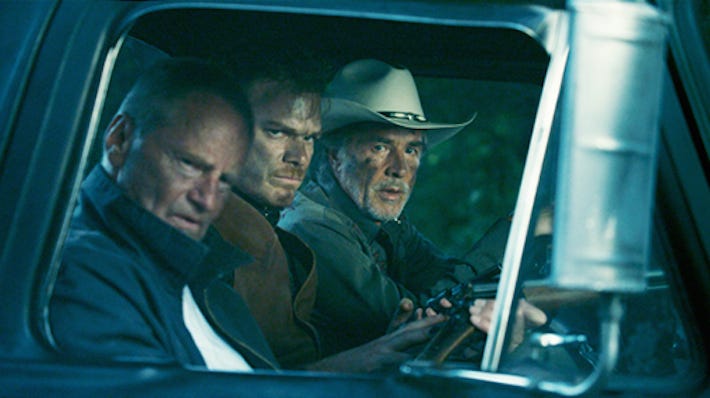One of the aims of this Substack is to uncover "Orphan" crime films, overlooked releases that deserve another look. Cold In July certainly falls into that category.
Helmed by an up and coming director and backed by IFC, Cold In July was well received at the 2014 Sundance Film Festival. However, while it made over $1 million overseas, it was a bomb in its US release.
A Texas small business owner (Michael C. Hall) is awakened by his wife in the middle of the night. He retrieves a handgun from his closet and confronts a burglar in his living room. He accidentally shots the intruder dead.
He is quickly cleared by local police, who label the shooting self-defense. He is told that the man's father, (Sam Shepard) was just paroled from prison and he winds up running into him at the cemetery, where Shepard delivers a veiled threat against Hall's toddler son. Initially, the police are reluctant to intervene, but when it becomes clear that Shepard is serious, they stake out Hall's home to try and catch him in the act.
Up to this point Cold In July is a standard "Psycho stalking a family" story. It's tense and suspenseful. Shepard is taken into custody off screen, the problem is seemingly resolved, then the movie takes a sharp left turn into something else.
I'm not going to provide any additional plot details, because the twists and turns that ensue are really the strength of the movie. Suffice it to say that Shepard goes from the main antagonist to Hall's partner, alongside a flamboyant private eye played by Don Johnson (who just slams it out of the park - again). The three of them discover the authorities are not only lying about what happened to Hall, but are part of a larger coverup that involves horrifying crimes. The trio goes after the perpatrators in a suitably Peckinpah-ish bloody climax.
Cold In July was adapted from a Joe Landsale novel by director Jim Mickle and his writing (and acting) partner Nick Damici. Both had previously collaborated on well-received horror movies Stake Land and We Are What We Are. Mickle does a great job of building suspense and managing the tone shifts necessitated by the plot twists.
Mickle is helped out by a great cast. Hall, burdened with an ugly haircut, breaks free from his Dexter role, playing a man who seems uncertain or unsettled about everything in his life. He struggles to deal with killing a man, which helps to feed into the main twist. As I mentioned, Johnson delivers yet another superior supporting role. But the real star is Shepard who delivers a riveting performance as a dangerous ex-con who is forced to confront deeply unsettling truths. He caps it by delivering a bone-chilling final line that has to rank as one of the greatest in Noir film history.
Mickle stated that Cold In July was a reflection on Men. "...this is a look at masculinity, being a contemporary man and what that means. [It’s] dominated by dude themes." He certainly delivers the Peckinpah goods and the only female character of consequence in the move is Hall's wife, played by Vanessa Shaw. She's, unfortunately, a shallow cliche: the bitch wife. But I think he fails in one respect, and it's my only real criticism of the movie. At one point, Hall has the opportunity to walk away from the dark and bloody confrontation, but he changes his mind and rejoins Shepard and Johnson to see it through. Mickle doesn't really provide any insight into why Hall makes that choice. There is no "Why not?" moment as there was in The Wild Bunch.
He could have staged a scene between Hall and his wife where he realizes he can't return to his normal life so long as that pure evil is still unchecked. Or, before leaving Shepard and Johnson, one of them could have had a conversation with Hall that stuck in his mind and left him so he couldn't turn his back on them at the moment of justice delivery.
The power of The Wild Bunch's "Why not?" moment is that it absolutely nails the movie's theme of the vanishing relevance of men like Bishop and his gang. They knew that there was no future for them and they chose to go out with agency rather than face their insigifigance.
I wasn't able to discern much of a theme for Cold In July. It's a classic Neo-Noir with corrupted law enforcement and characters on the fringes of society colliding with normalcy. It checks all the boxes and that's OK. It's a well-made crime drama with a great cast and to me, that's enough.




